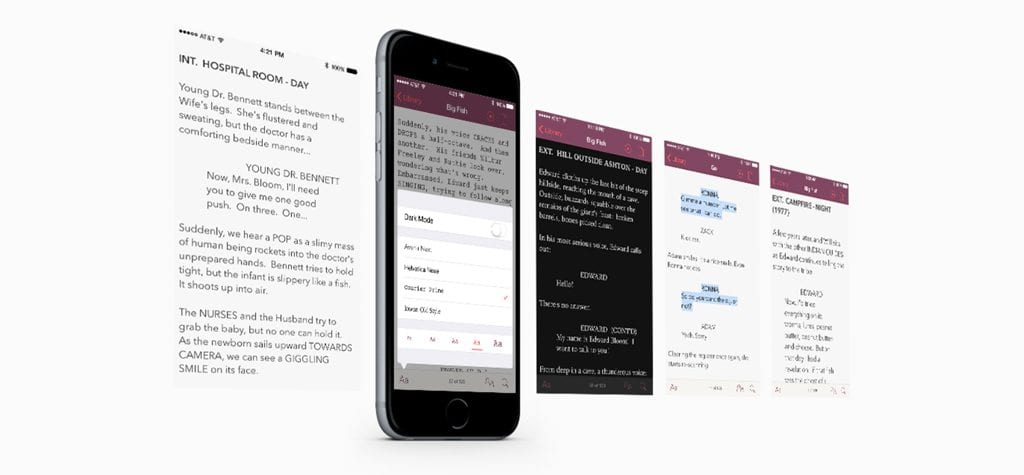Yes – Screenwriting formatting really is that important
10. Augment your craft with the best tech tools
Most writers know the seriousness of screenplay formatting. However, some of us couldn’t give a rat’s heinie. If you assume that just because yours generally looks like a script you’ll be fine, Steven Spielberg will personally find you and burn you at the stake as a witch. Since we really don’t want this to happen, this one’s for you.
Formatting is immensely important. There a hundred different reasons, but we’ll share just the most important ones with you today.

One page = one minute
Scripts are formatted the way they are for ease of reading in all the different departments across the production of a film. The timing rule of thumb is: when reading a script, one’s eyes fall down the page at about the same speed it would take to watch the content on that page in the final video edit.
Each page roughly represents one minute of screen time. This is an important rule; everyone in the production needs to know how long the final product will be. It’s crucial for the actors to be able to see where their lines are at a quick glance without having to comb through the page. (Actors ain’t exactly the sharpest tools in the workshop and need things to be as simple as possible.)

Stage directions are generally grouped into paragraphs no longer than three sentences in order to maintain the one-minute page rule. There are exceptions – sometimes it is crucial for the story that an image is defined in greater detail – but be careful not to fall into the trap of overusing stage direction or you’ll end up writing the script equivalent of War and Peace.
If you want to explain a setting in detail, think carefully about whether the page can afford a block of prose that might stall the pace – because that’s what you’ll be doing. Is it so important to detail the setting or action to such a degree that you jeopardize the flow of your story? Usually the answer is no.
Remember: your script lays the blueprint for the director. If there are any important sounds or props written in the action that are integral to your story, write them in capitals.

How to format a scene heading
Scene heading (a.k.a. slugline) formatting is the most common mistake in scripts, so listen up!
- Establish whether it is interior (INT.) or exterior (EXT.).
- After that period and a single space, establish where the scene is: “EXT. GARDEN”.
- Then write a single space, a hyphen, another single space, and finally establish whether it is DAY or NIGHT.
- “EXT. GARDEN – NIGHT”
Job done! It is not considered unprofessional to write sluglines in bold, but take it from us: it looks untidy.

The simplest way to learn how to format a script properly is to read as many professional scripts as possible. Access to hundreds of the best scripts is available through our website for you to peruse and learn from.
Formatting doesn’t exist to make your life difficult. In fact, it does the exact opposite. Formatting ensures your story is told as clearly as possible. If you don’t format your script properly, the spirit of your magnificent story will get lost in the ether of mediocrity, as readers can’t visualize it as a film.

Learning film language
That’s what you’ll learn by understanding formatting: how to write your stories in film language. See, we’re teaching you to be bilingual! Don’t bother with French or Spanish, just learn film language instead! You should care more about formatting than you do your own family. (Not really, but beginners just tend to underestimate its importance.)
Thousands of scripts are entered into screenwriting competitions every year and the competition is fierce! There are a few amazing scripts that turn up, a lot of decent ones, and an abundance of bad ones. You can bet your bottom dollar that the majority of the horrendous ones have not been formatted properly.

Don’t give your script reader an immediate reason to slam-dunk your script onto that teetering “no” pile. Because the competition is so intense, readers look for any shortcut available to reject your script. It sounds harsh, but they have to – the more scripts they read, the more they get paid generally.
But if you want your script in that slim but victorious “yes” pile, then read on and follow the suggestions below.

Homework
Here’s a neat little list of everything we mentioned earlier, so you don’t have to scroll through the whole lesson again – we‘re good to you, aren’t we? Now, get cracking!
Task 1
Desktop delicacies
Here are the computer screenwriting tools you can check out for yourself:
- Final Draft 10: $299.99
Current industry standard - Celtx (basic): FREE (approx. $19.99 through the App Store)
Most-used software, due to its industry contending features & price.

Task 2
For the small screen wordsmiths
Here are the mobile screenwriting apps we recommend:
- Final Draft: in-app purchase for full use
- Celtx: FREE
- WriterDuet – FREE
Rumored to be slowly overtaking Final Draft as the industry favorite - Scripts Pro: approx. $19.99
Highly reviewed, contending app; compatible with Final Draft & Celtx - Slugline: Simply Screenwriting: approx. $39.99
Nothing substantially differentiated from the others, but worth checking out
You will soon discover what works best for you. Good luck!
Extra credit
Ruminate on your movie title. You should be happy with your choice – but remember that you can always change it.








Sean McLaughlin
/
Good stuff. Reading existing movie or TV scripts also reveals differences between the two. It’s important to know the difference!
September 11, 2020